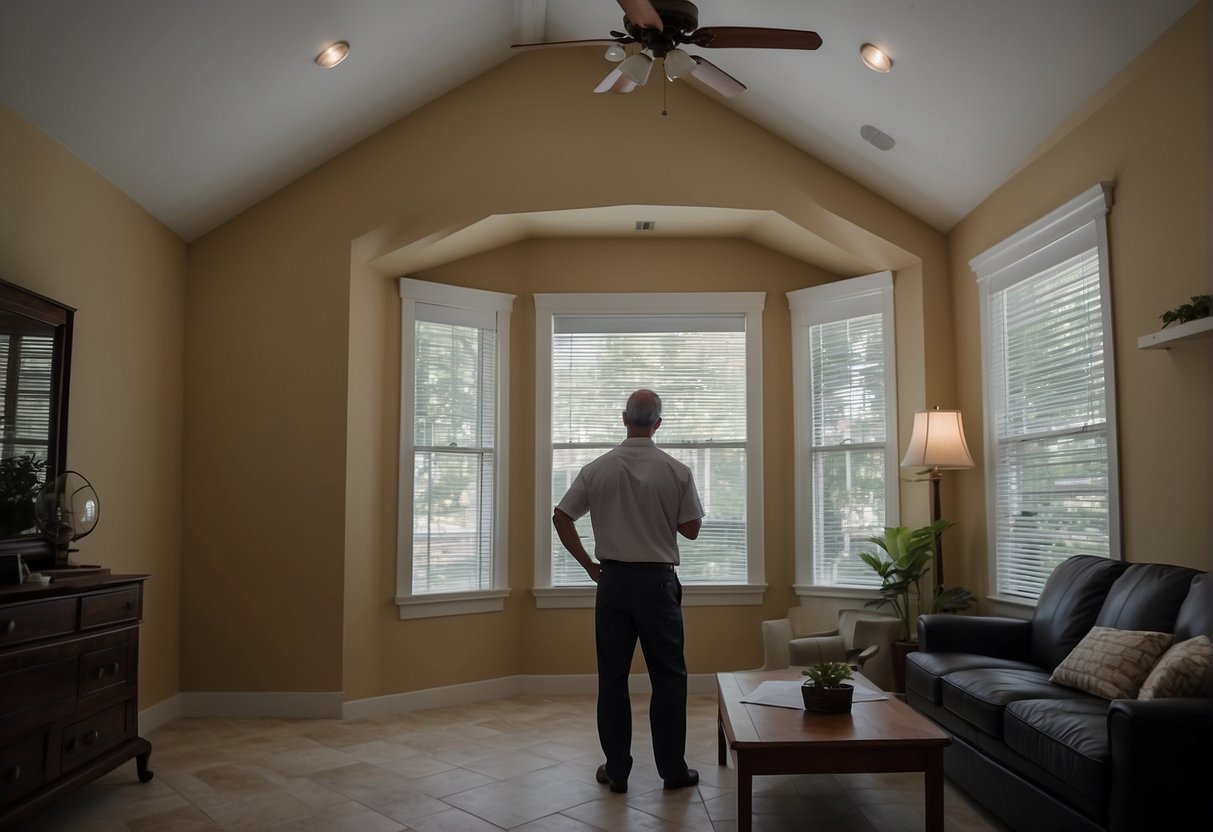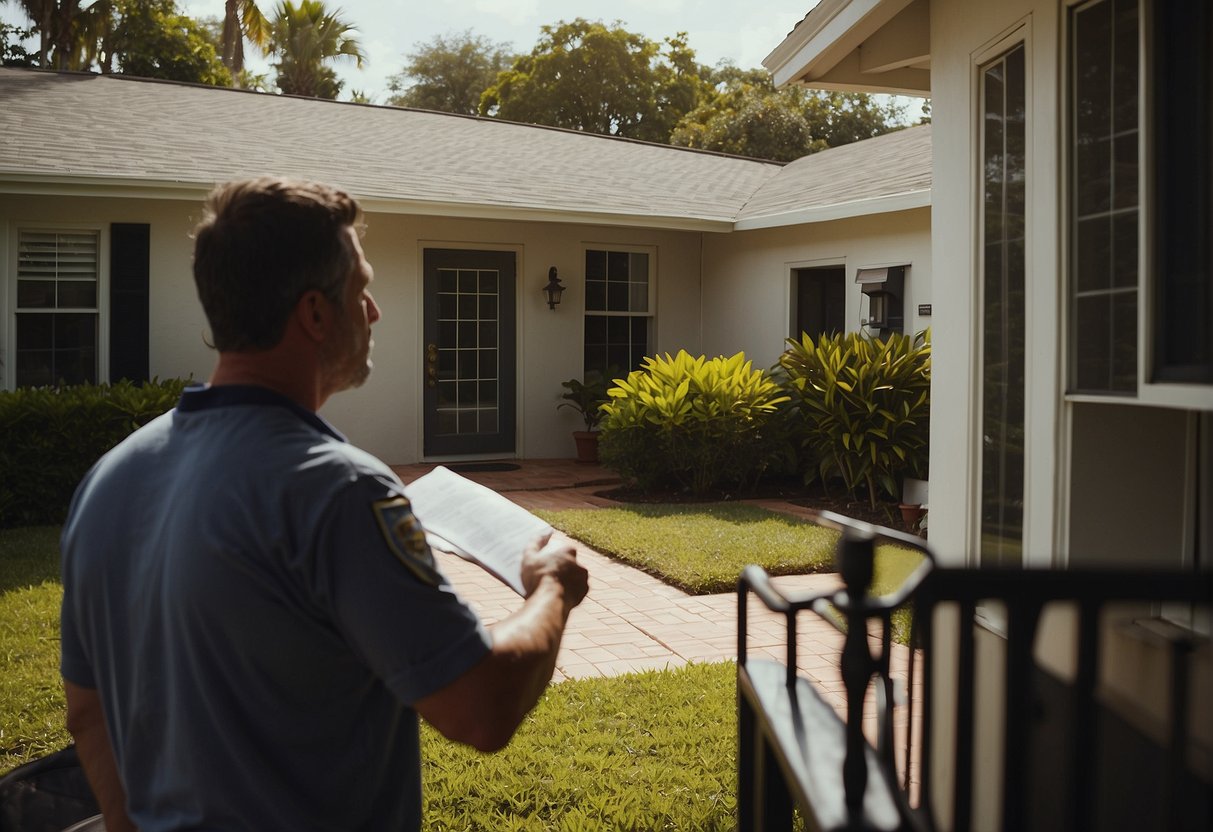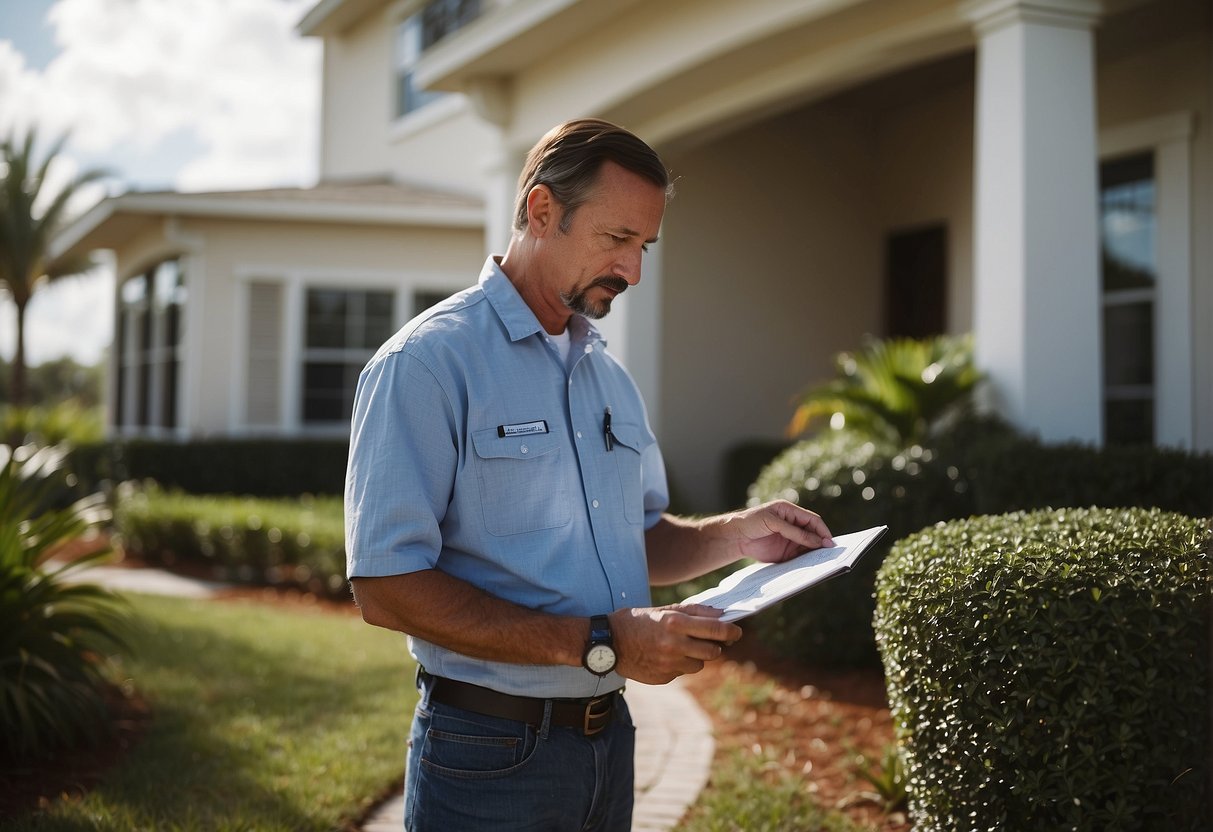When purchasing real estate in Florida, a critical step is to conduct a home inspection. This process provides a thorough assessment of the property’s condition and identifies any potential issues that could require attention in the future. A home inspection is not only crucial for the buyer’s peace of mind but also can serve as a valuable tool in the real estate transaction process, potentially affecting the final negotiated price.

The cost of a home inspection in Florida can vary, largely dependent on the size and location of the home. On average, prospective homeowners might expect to pay anywhere from $250 to $500 for a home inspection. Factors influencing this price include square footage, the age of the home, and any additional services beyond the standard inspection, like checking for mold or radon gas.
Specifically for Florida, common concerns such as water damage or the state of the roof are among the top issues that inspectors look into due to Florida’s unique climate and weather conditions. Understanding these costs and considerations is essential for anyone looking to own a piece of real estate in the Sunshine State.
Understanding Home Inspections in Florida

A comprehensive understanding of home inspections in Florida is essential for anyone considering a real estate transaction in the state. These inspections can heavily influence the buying process by identifying potential issues with a property.
What Is a Home Inspection?
A home inspection is a visual examination conducted by a qualified inspector to assess the physical structure and systems of a property. In Florida, this encompasses a thorough review of various components including the roof, foundation, electrical systems, plumbing, and HVAC systems. The goal of a general home inspection is to provide an unbiased report detailing the property’s condition.
Legal and Regulatory Framework in Florida
In Florida, home inspectors are regulated by the Florida Department of Business and Professional Regulation. All professional inspectors must be licensed to ensure they meet certain standards of practice and adhere to the state’s codes. The inspection process follows specific guidelines which include non-invasive, visual assessments of the accessible areas of the home. Florida law does not mandate sellers to conduct home inspections, but they are highly recommended as part of the real estate transaction.
Components of a Home Inspection

A comprehensive home inspection in Florida encompasses a critical evaluation of the home’s major systems and structural components. It involves a thorough examination by a professional to assess the condition of the house and identify any necessary repairs or potential issues.
Exterior Evaluation
The exterior evaluation covers the condition of the home’s siding, soffits, fascia, and exterior doors and windows. This includes checking for proper sealing, signs of damage, and decay. The inspector assesses doors and windows for proper installation and functionality.
Interior Examination
An interior examination scrutinizes the walls, floors, ceilings, and stairs, looking closely for any signs of water damage or structural concerns. Each room’s condition is meticulously evaluated, with particular attention given to HVAC system vents and operation.
System Checks
System checks involve a review of the home’s key systems, including the HVAC, electrical systems, and plumbing. This part of the inspection ensures that each system is functioning correctly and safely, adhering to state and local codes.
Roof and Attic Inspection
Inspectors thoroughly review the roofing systems and attic space, checking for proper insulation, ventilation, and the absence of leaks or water damage. They assess the condition of roofing materials and look for potential signs of termite inspections or other pest infestations.
Plumbing and Electrical Systems Review
The plumbing and electrical systems review includes a close look at pipes, fixtures, water heaters, and sewage systems for the plumbing system. The inspector also examines the electrical systems for outdated wiring, safety issues, and code compliance in panels, outlets, and switches.
Foundation Inspection
During the foundation inspection, the integrity of the home’s base is assessed. The inspector looks for cracks, shifting, and water intrusion that may indicate foundational issues. They will also check the basement or crawlspace for moisture problems or structural concerns.
Determining the Cost of a Home Inspection
When looking to understand home inspection costs in Florida, it’s essential to consider several impactful factors. These can significantly influence the price, from the size of the property to the specific type of services required.
Factors Affecting Home Inspection Cost
The cost of a home inspection is not a fixed number and can vary widely. Several key factors influence the final price:
- Square Footage: Larger homes require more time to inspect, leading to higher fees.
- Location: Rates can differ based on the Florida region, with some areas having higher prices due to demand and cost of living.
- Type of Inspection: A standard inspection may cost less compared to more specialized inspections such as wind mitigation, 4-point inspections, or those focusing on termite, radon, or mold testing.
- Home’s Condition: Older homes or those in need of repairs might necessitate a more thorough inspection, increasing the cost.
- Inspector’s Experience: More experienced inspectors may charge higher rates due to their expertise.
Typical Cost Range in Florida
In Florida, home inspection costs can typically range as follows:
- Low End: $200-$300 for smaller homes or condos.
- Average: $300-$500 for a standard single-family home.
- High End: $500-$700 for larger or more complex properties.
These prices are indicative and should be confirmed with local inspectors for more accurate estimates.
Additional Home Inspection Services
Apart from the standard inspection, homeowners in Florida may opt for additional services that can identify potential issues and save on expensive repairs down the line. These services include:
- Wind Mitigation Inspection: Essential for areas prone to hurricanes, and can often lead to insurance discounts.
- 4-Point Inspection: Often required for insurance, focusing on the roof, electrical system, plumbing, and HVAC.
- Termite Inspection: Critical in regions where termite infestations are common.
- Radon Testing: Important for health reasons, detecting harmful levels of radon gas within the home.
- Mold Testing: Necessary for detecting mold that could impact the home’s air quality and structure.
Each of these specialized inspections will add to the overall home inspection cost but provide invaluable insight into the property’s condition.
The Importance of Home Inspections
Home inspections play a vital role in the real estate transaction process, providing both buyers and sellers with critical information about the condition of the property.
For Homebuyers and Sellers
For homebuyers, a home inspection can be the linchpin in a significant investment. It offers a detailed report of the property’s state, revealing any defects or safety hazards that may not be visible during a casual walkthrough. This information can be crucial when negotiating the sale price, ensuring potential buyers do not overpay for a home with hidden issues. For those selling a home, presenting a written report from a general inspection can instil trust and may help in solidifying the sale price, demonstrating transparency in the real estate market.
Safety and Investment Considerations
A home inspection assesses various safety aspects of a property, providing peace of mind to both buyers and sellers. Structural issues, electrical hazards, and potential fire risks are inspected, averting the chance of future catastrophe. In the long term, the small upfront cost of an inspection safeguards against unforeseen expenses. Furthermore, the inspection contingency in a real estate contract allows homebuyers to make informed decisions, backing out from a sale if the inspection reveals costly defects, thereby protecting their investment. By including a home inspection contingency, they ensure that the act of buying a home is not only an emotional decision but a sound financial strategy.
Inspections in the Florida Real Estate Market
The cost of home inspections in Florida can vary significantly based on regional factors and the unique challenges posed by local conditions. Given the state’s diverse real estate market and environmental influences, it’s essential for buyers and sellers to understand these dynamics.
Regional Inspection Considerations
In metropolitan areas like Miami and Tampa, home inspections may include a closer look at structural integrity due to the premium on space and the concentration of high-rise buildings. Orlando and Jacksonville present a mix of newer constructions and established homes, necessitating tailored inspections that consider the age and condition of the property. The size of the property is also a pivotal factor across Florida’s local markets, impacting the inspection duration and complexity.
- Miami: Enhanced focus on moisture intrusion due to proximity to the ocean.
- Orlando: Diverse construction styles require a versatile approach to inspections.
- Jacksonville: A blend of historic and new homes demands a comprehensive assessment.
- Tampa: Inspection of coastal homes often includes a wind mitigation component to assess hurricane readiness.
Property size significantly affects inspection costs, with larger properties naturally requiring more extensive evaluations.
Impact of Local Conditions on Inspections
Florida’s susceptibility to hurricanes necessitates specialized inspections that assess the ability of a home to withstand such events. These inspections are crucial, especially for homes along the coastline and in hurricane-prone areas. They often extend to wind mitigation measures that can influence insurance premiums, making them an integral part of the inspection process.
- Hurricanes: Structural integrity and wind mitigation are key elements.
- Florida homes: Often require checks for humidity-related issues and pest inspections due to the tropical climate.
- New homes: May still need inspections to verify build quality and adherence to local building codes.
The real estate market in Florida, much like the weather patterns, can be dynamic, and a thorough home inspection provides a solid foundation for making informed decisions in property transactions.
Additional Considerations and Inspections
When evaluating the cost of a home inspection in Florida, it’s crucial to account for both standard and specialized inspections. These additional inspections can address specific concerns related to the home’s features or satisfy insurance requirements, potentially affecting your overall investment in the property’s evaluation process.
Specialized Inspections Based on Home Features
Certain homes may necessitate specialized inspections beyond the general examination. Common types of specialized inspections include:
- Termite Inspection: Florida’s climate is conducive to termite infestations, making thorough termite inspections essential for evaluating structural integrity.
- Mold Inspection and Testing: Due to high humidity levels, a mold inspection can determine the presence of mold, which might not be visible during a general inspection.
- Radon Testing: Radon is a naturally occurring gas that can pose health risks. Radon testing in areas with known radon prevalence is an important specialized procedure.
- Wind Mitigation Inspection: To assess a home’s resilience against high winds, a wind mitigation inspection is advised, especially in hurricane-prone zones.
Insurance and Inspection Requirements
Florida homeowners may require additional inspections to obtain or maintain home insurance. Insurers often seek particulars regarding a property’s condition and risk factors:
- 4-Point Inspection: Many insurers ask for a 4-Point Inspection that specifically examines the roof, electrical system, plumbing, and HVAC.
- Insurance Coverage: Adequate insurance coverage might depend on formal assessments of risk areas, such as the presence of a basement or crawl space which could affect the likelihood of water damage or pests.
- Inspection Certifications: Some insurance companies may require inspections to be completed by inspectors certified by recognized organizations such as the American Society of Home Inspectors (ASHI).
- Asbestos Testing: In older homes, asbestos testing might be required to ensure the safety of inhabitants and to outline any required remediation in the insurance policy.
Considering these factors and obtaining relevant specialized inspections can provide not only peace of mind but also a more precise determination of the home’s condition, which may be imperative for securing insurance coverage.
Choosing the Right Home Inspector
Selecting an adept home inspector is crucial for an accurately evaluated inspection report which can impact your property’s sale or purchase. It is essential to consider their qualifications, track record, and the clarity of the report they provide.
Qualifications and Certifications
A qualified home inspector should possess certifications from established organizations such as the American Society of Home Inspectors (ASHI). These credentials indicate that the inspector has met certain industry standards. Homebuyers should confirm that the inspector has completed professional training and adheres to a recognized code of ethics.
Finding a Reputable Home Inspector
To find a reputable home inspector, start with recommendations from real estate professionals, but also seek reviews from prior clients. It’s advisable to engage with more than one number of inspectors to compare their services and fees. Ensure that they offer a pre-listing home inspection if you’re a seller, which can help identify any potential issues before listing your property.
Understanding the Inspection Report
The quality of an inspection report is as important as the inspection itself. The report should be comprehensive and come with a checklist that covers all inspected areas. Buyers should clarify whether their inspection contingency allows room for renegotiation or withdrawal based on the report. The inspector should make it known how they handle any issues discovered during the inspection.
Negotiating After a Home Inspection
After a home inspection in Florida, buyers can use identified defects to negotiate on price or request repairs. This process is a critical step in real estate transactions and involves strategic discussions.
Leveraging Defects for Negotiations
Home inspections can reveal issues ranging from minor to severe. Buyers should prioritize the most significant defects and use them as leverage in negotiations. They might aim for a price reduction or request that the seller addresses the critical concerns before the purchase is finalized. For example, if an inspection uncovers a failing roof, buyers could negotiate for a lower purchase price to cover the cost of repairs.
Discussing Repairs and Concessions
Following the inspection, buyers and sellers enter discussions to reach an agreement on handling defects. Options may include the seller completing repairs before the sale or providing concessions, such as credits, to the buyer. The negotiations should focus on repairs that are necessary for safety, structural integrity, or functionality. For instance, the presence of electrical issues might prompt buyers to request pre-closure repair or a price concession to manage the costs themselves.
Frequently Asked Questions
In Florida, the cost of a home inspection can vary due to several factors. This section aims to address common inquiries regarding these variables and their impact on pricing.
What factors determine the cost of a home inspection in the state of Florida?
The cost of a home inspection in Florida is influenced by factors such as the type of inspection, the property’s size, and the specific location within the state. Experience and qualifications of the inspector also play a role.
Can the size of a property influence the price of a home inspection in Florida?
Yes, the property size significantly affects the price of a home inspection in Florida. Larger properties require more extensive inspection, which tends to increase the overall cost.
What is included in a 4-point home inspection, and how is its cost assessed?
A 4-point home inspection usually includes an evaluation of the roof, electrical system, plumbing, and HVAC. The cost is assessed based on the complexity of these systems and the time needed to inspect them.
How do the qualifications and experience of a home inspector impact their fees in Florida?
Inspectors with more qualifications and experience often charge higher fees due to their expertise. These professionals may provide more comprehensive reports and insights, justifying the added cost.
What is the average duration of a home inspection process in Florida?
The average duration of a home inspection in Florida is around 2 to 3 hours, but this can vary based on the property’s size and condition.
In a real estate transaction in Florida, who is typically responsible for covering inspection and appraisal fees?
Typically, the buyer is responsible for the inspection fees, as they are part of the buyer’s due diligence. Appraisal fees, on the other hand, are often the responsibility of the buyer as well, although they might be negotiated as part of the closing costs.
